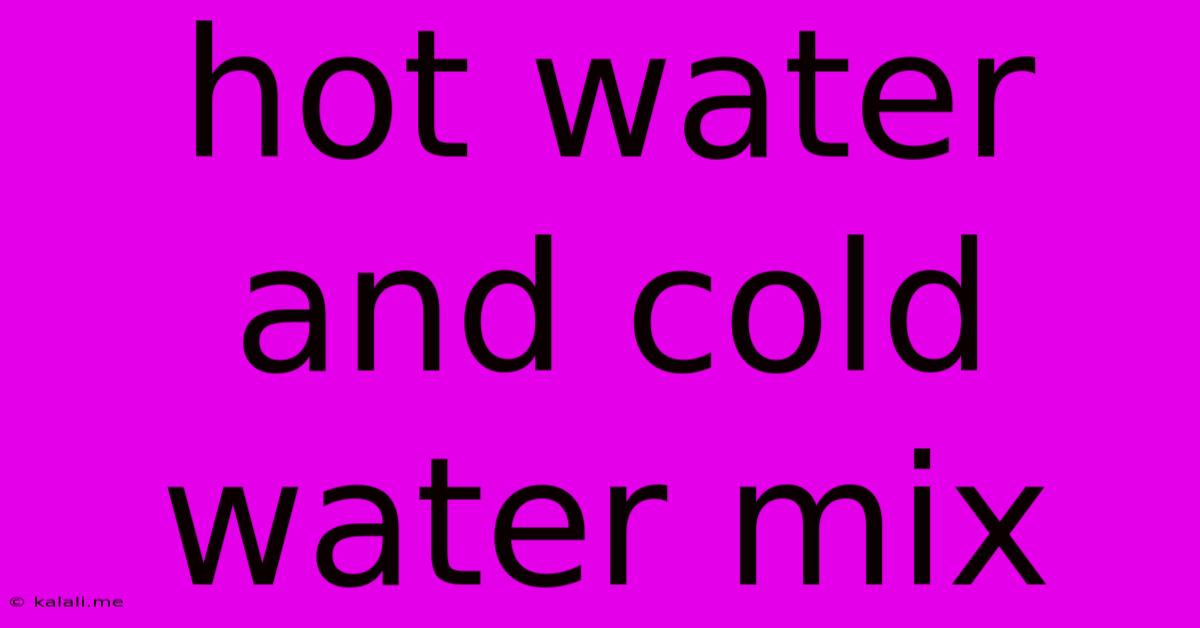Hot Water And Cold Water Mix
Kalali
May 20, 2025 · 3 min read

Table of Contents
The Science and Practicalities of Mixing Hot and Cold Water
Mixing hot and cold water is a seemingly simple act, yet it reveals fascinating insights into the physics of heat transfer and has practical implications in various aspects of our daily lives. This article delves into the science behind this common occurrence, exploring its properties, potential applications, and even some common misconceptions.
Why does mixing hot and cold water result in lukewarm water? This is fundamentally about the transfer of thermal energy. Hot water possesses more thermal energy than cold water. When they are mixed, the hot water transfers its energy to the cold water until thermal equilibrium is reached – a state where both have the same temperature. This results in lukewarm water, a temperature somewhere between the initial hot and cold temperatures. The exact final temperature depends on several factors including the initial temperatures of the hot and cold water, and the volumes of each.
Factors Affecting the Final Temperature
Several factors influence the final temperature when mixing hot and cold water:
- Initial Temperatures: The greater the difference between the initial hot and cold water temperatures, the more significant the temperature change will be. A large difference will lead to a wider temperature range in the final mix.
- Volumes of Water: Equal volumes of hot and cold water will likely result in a temperature closer to the average. However, a larger volume of hot water mixed with a smaller volume of cold water will result in a warmer final temperature, and vice versa.
- Heat Loss: The process isn't perfectly efficient. Heat can be lost to the surroundings (e.g., the container, the air) during the mixing process. This loss slightly reduces the final temperature. Insulated containers can minimize this effect.
- Specific Heat Capacity: While water has a relatively high specific heat capacity (meaning it takes a lot of energy to change its temperature), other substances mixed with water will impact the final temperature. For instance, mixing hot water with cold oil will yield a different temperature than mixing two equal volumes of water.
Practical Applications and Everyday Examples
Mixing hot and cold water is a fundamental process with applications across many areas:
- Temperature Regulation: From adjusting shower temperature to preparing baby formula, accurately mixing hot and cold water is crucial for achieving a safe and comfortable temperature.
- Industrial Processes: Many industrial processes require precise temperature control, often achieved through carefully mixing hot and cold water or other liquids. Think of cooling systems in power plants or temperature regulation in chemical reactions.
- Cooking: Many recipes call for lukewarm water, which is achieved through mixing hot and cold. This is essential for certain baking processes and yeast activation.
- Cleaning: Mixing hot and cold water can optimise cleaning efficacy, depending on the cleaning agent used.
Common Misconceptions
- Volume Changes: Mixing hot and cold water does not significantly change the total volume of water. While the density of water changes slightly with temperature, the overall volume change is negligible for most practical purposes.
- Instantaneous Mixing: It takes time for the hot and cold water to reach thermal equilibrium. The mixing process itself introduces some variability.
In conclusion, understanding the principles of mixing hot and cold water goes beyond a simple observation. It involves the interplay of thermal energy, volumes, and heat transfer, making it a fascinating example of basic physics with practical applications in various aspects of our lives. By appreciating these factors, we can better control and utilize this common process in various settings.
Latest Posts
Latest Posts
-
Why Did Walt Punch The Towel Dispenser
May 20, 2025
-
What Is The Hottest Part Of The Oven
May 20, 2025
-
How To Remove Glued Carpet From Wood
May 20, 2025
-
Its Just Like Riding A Bike For One
May 20, 2025
-
What To Say Instead Of Chinese Whispers
May 20, 2025
Related Post
Thank you for visiting our website which covers about Hot Water And Cold Water Mix . We hope the information provided has been useful to you. Feel free to contact us if you have any questions or need further assistance. See you next time and don't miss to bookmark.